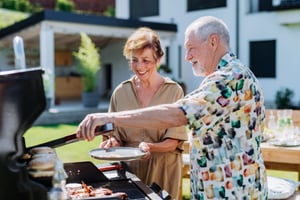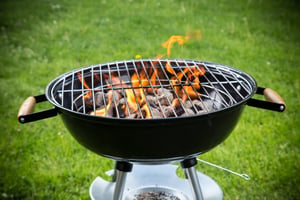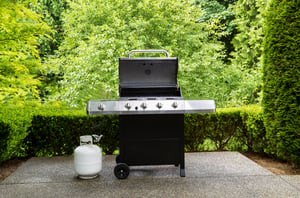
Summer will soon be here – and with summer comes outdoor events like barbecues.
Barbecues can be a fun way to make an especially tasty meal, but they also come with fire risks. From 2014-2018, fire departments responded to an annual average of 8,900 home fires involving grills or similar equipment, according to the National Fire Protection Association (NFPA). Along with this, an average of 19,700 people went to the ER each year due to injuries involving grills.
Fortunately, there are some steps you can take to help mitigate your risks of fire and injuries – and to ensure your next barbecue goes on without a fire safety emergency.
All Grills
There are several types of grills available, and the most common are charcoal or propane gas grills. While there are specific considerations for each type, some general advice applies to any type of grill.
These tips include:
-
Only use grills outside, and place them well away from the house, deck railings, and eaves or overhanging branches. The grill should be at least 3 feet away from any of these types of items.
-
Keep children and pets at least 3 feet away from the grill at all times.
-
Clean the grill before each use with a grill brush, and don’t forget to clean out the tray or underpart of the grill as well.
-
Never leave the grill unattended – even for a minute.
Charcoal Grills
 Charcoal grills use charcoal to cook the food, often with the charcoal going into a bed at the bottom of the grill, and the actual grill grating over the top. This type of grill also requires more specific ignition or lighting in order to get going.
Charcoal grills use charcoal to cook the food, often with the charcoal going into a bed at the bottom of the grill, and the actual grill grating over the top. This type of grill also requires more specific ignition or lighting in order to get going.
With charcoal grills, keep in mind the following tips:
- If using lighter fluid, only use charcoal specific lighting fluid. Ideally, use a chimney of charcoal and light using newspaper, rather than using lighter fluid.
- Another option is to use an electrical fire starter, which doesn’t use fire to get it lit at all. If you do this, make sure you use the correct type of extension cord – and one rated for outdoor use.
- Keep charcoal lighter fluid and other lighting materials out of reach of children at all times.
- When you’re done grilling, let the coals cool completely before disposing of them in a metal container.
Gas Grills
Gas grills are easier to use than charcoal grills, and they heat up much faster. However, they can also be riskier. According to the NFPA, while charcoal grills are involved in 1,300 home fires per year, gas grills account for 8,900 home fires per year.
If you opt to use a gas grill, keep the following safety advice in mind:
-
Always check the gas tank hose for leaks before using it every year. You can do this with the “soapy bubble test.” Apply a light soap and water solution to the hose, and if you see bubbles, you know there’s a propane leak. If you notice this, immediately turn off both the gas tank and the grill. If the leak stops – and the bubbles stop – get your grill serviced by a professional before using. If it doesn’t stop, immediately call the fire department.
-
If you smell gas while cooking, immediately get away from the grill and call the fire department – do not move the grill.
-
If the flame goes out, turn the grill gas off and wait at least 5 minutes before re-lighting it.
-
Always make sure the gas grill lid is open before lighting it.
Summer is a great time for outdoor celebrations, but it’s important to consider fire safety when planning to host an outdoor grilling event. By following the advice above, you can help keep your family and friends safe during your next event.
